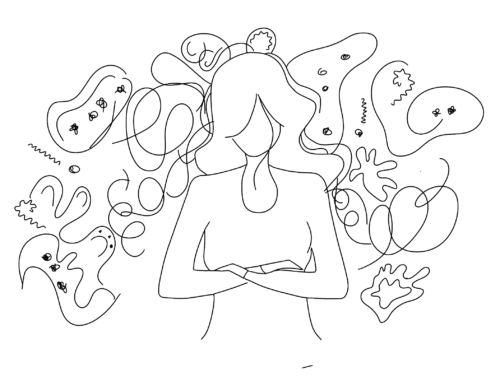It was almost 9 in the morning when my roommate paused in front of my open bedroom door on her way to class. She was ready for the day: coffee in hand, hair done, and backpack squarely on her shoulders. She blinked bewilderedly, looking past me to examine my spotless, sparkling bedroom: freshly made bed, clean-swept floor, empty trash bin, and meticulously arranged desk.
“It’s so clean,” she said, surprised. The night prior, she had walked past my room and seen the floor of my 150-square-foot single covered in clothes, notebooks, toiletries, and more. Now, not even eight hours later, the old wood almost gleamed.
“Yeah,” I managed. “Have a good day.” As she walked out the door, I sank to the floor, put my head in my hands, and took a deep breath. It was time to face the day, and there was no time to take a nap before my first class. But at least my room was tidy again.
Struggling to stay tidy is challenging enough, but coupled with gendered expectations, it becomes overwhelming. Since the Enlightenment, ideals of femininity have been deeply intertwined with tidiness. At the time, the tidiness expectation was captured by the concept of women as “angels in the house,” which valued women for maintaining orderly homes, and by influential thinkers like John Ruskin, who asserted that a woman’s role was to “order, arrange, and decide.”
This expectation persisted into the 20th century, reinforced by advertising such as a 1963 Hoover ad urging husbands to gift their wives vacuums, claiming, “She cares about her home, so if you really care about her…wouldn’t it be a good idea to consider a Hoover for Christmas?” From Tupperware commercials in the 1960s to modern Rubbermaid ads, these gendered expectations have persisted into the 21st century. Modern portrayals of messy women only exacerbate the idea. The “Messy Millennial Woman” or “Messy Modern Woman” trope, which exists in characters such as Phoebe Waller-Bridge’s Fleabag, paints the messy woman as a trainwreck: fascinating yet inherently flawed, falling short of societal expectations of femininity.
As a woman who struggles significantly with keeping my space organized, this advertised ideal has been difficult to grapple with. To me, tidiness sometimes feels like an elusive requirement to be “woman enough.” As women, how can we be content with who we are, when who we are does not match the constant barrage of others telling us what we should be? Studies confirm that women experience higher pressures to be tidy in comparison to men. For women with ADHD, these expectations are even more challenging. Studies on women with ADHD find that when we do not meet these often unreachable expectations, we suffer social consequences for violating gendered expectations.
One study on adult women with ADHD describes how we are socially encouraged to display “feminine” traits such as “organization,” and that “when [women] display behaviors consistent with ADHD symptoms…[such as] disorganization…they are at a higher risk for social judgment for violations of feminine norms.” Another study further explains that women with ADHD are pressured to exhibit traditional “feminine” qualities, such as being “home-organizers.”
These societal pressures have real consequences. Moreso than men with ADHD and women without the condition, women with ADHD tend to experience “deeply embedded feelings of lowered self-esteem and self-efficacy,” and are significantly more likely to experience anxiety, depression, suicidal ideation, and other comorbid disorders.
When gendered expectations feel like prerequisites for being considered “woman enough,” yet remain unattainable, it is no surprise that women with ADHD suffer so severely with low self-esteem, anxiety, and depression. Being denied our femininity because we violate gendered expectations is deeply harmful; as human beings, we thrive when we can express ourselves authentically and feel that our identities are validated, not judged by arbitrary expectations.
Authentically, I am feminine. My clothes are rarely folded in my drawers, my desk is like a hidden object’s game of scattered nail polish, pens, and post-its, and I once found my wallet in the freezer. My jewelry may be strewn all over my room, but I love matching my earrings, rings, and necklaces to my outfits every morning. I may be messy in the kitchen, but I take pride in cooking for the people I love. All of this is not to say that femininity cannot be presented in other, less conventional forms. But everyone’s version of being authentic themselves is different, and for me, I express my femininity in a sacred practice that was passed down to me: by taking care of my loved ones through cooking.
I am slowly learning to sever the connection between my messiness and my status as a woman. That does not mean I do not strive to be more organized in my daily life; I try hard to keep my space tidy and to find organization methods that work for me. Rather, it means that I try not to let my failure to be tidy define anything larger about my identity. I am just as much a capable woman when my room is spotlessly clean as when it is messy. Femininity does not have to be neat—femininity can be chaotic.
Abril Rodriguez Diaz ’26 (abrilrodriguezdiaz@college.harvard.edu) is the Forum Editor of the Independent.

